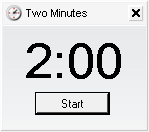The Curse Of The Eternally Urgent
“If the Next Action can be done in 2 minutes or less, do it when you first pick the item up. Even if that item is not a “high priority”, because it takes longer to store and track any item than to deal with it the first time its in your head.” (p. 131, “Getting Things Done”)
Ignoring secondarily important actions and projects because you are too busy and concerned with urgent things fosters continual crisis management. It never self-corrects; it self-perpetuates. Where do fires and crises come from? Usually from not-so-urgent things that people ignore because they are distracted by the crises of the moment. Then, ignored, they cause the next fires and crises.
For example, ignoring worn tires because they're not yet urgent sets up the likelihood of a blowout. Whatever else was lined up for later has now become a candidate for crisis because changing the tire has become your very next appointment. And by the way, does that spare have air? It's not urgent, but it will take less than two minutes to check, next time you fill up the tank with gas.
Someone heard second hand about my "two-minute rule" (if the action on something takes less than two minutes, do it as soon as you look at or think of it) and thought it was ineffective. "I'd waste my whole day doing two-minute things, many of which are not that important." My retort was: if they're not important enough to do, they're not important enough to do at all! You're either going to do something or you're not. If you're going to do it at all, and it takes less than two minutes, 95% of the time you'll save time and be much more proactive if you do it immediately.
I think you'll find that many big and important projects have a two-minute-or-less next action on them. You can move several big and important projects forward, and feel better about making progress, by doing a few two-minute-or-less next actions.
I'm not talking about ignoring priorities. I am talking about capturing, deciding, and organizing action steps about everything we have our attention on, big and little. The little, unimportant things too often demand much more attention later on than they deserve, and become too important because they weren't handled when they would have been easy. And many of them can be handled very efficiently in the little weird windows of time we get in odd situations and circumstances.
My "total life to-do list," with me all the time and sorted by context, provides me with lots of options to maximize my productivity wherever and whenever. It creates much more smooth sailing through the mundane day-to-dayness of life. It breaks the cycle of the eternally urgent.
A crisis should be a crisis. Urgent things should be urgent. And they should be exceptional.
You can find out more about David Allen and GTD at http://www.davidco.com


Comentarios